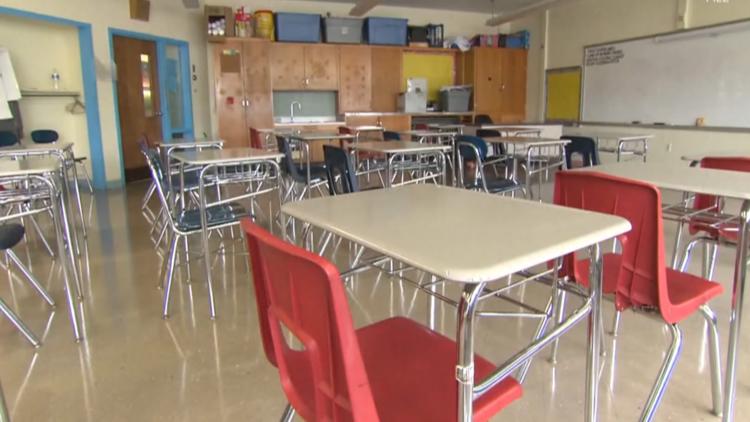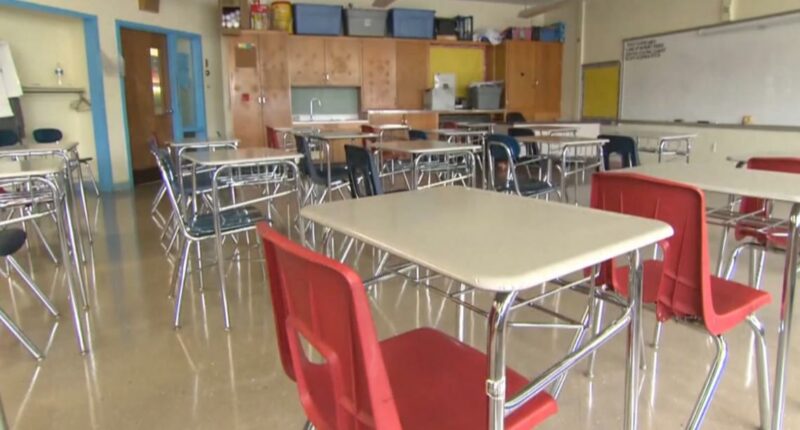Share this @internewscast.com

Amid a swirl of debate, Florida’s recent adoption of the Phoenix Declaration has stirred both controversy and commendation. Critics caution that the initiative is driven by political motives, while proponents insist it aims to realign education with fundamental values.
JACKSONVILLE, Fla. — Florida has taken the national spotlight as the first state to embrace the ‘Phoenix Declaration,’ an educational framework devised by a foundation with conservative roots. This move has ignited a spectrum of opinions, highlighting a divide between those who view it as politically charged and those who see it as essential for reinforcing core educational values.
Opponents argue that the initiative, as reported to First Coast News, carries a political agenda that might not serve the best interests of students. In contrast, advocates emphasize the declaration’s role in restoring education’s focus on fundamental skills and values, deemed crucial for the nation’s future.
On November 13, the Florida Department of Education made headlines by unanimously voting to “ratify and adopt” the Phoenix Declaration as the state’s new guiding educational principles.
The initiative was developed by the Heritage Foundation, known for its conservative leadership. The foundation envisions a future where every student receives a “high-quality, content-rich education aimed at pursuing the good, the true, and the beautiful,” enabling them to realize their full potential as endowed by their creator.
The Phoenix Declaration outlines seven key principles designed to shape the educational landscape in Florida:
-
Parental Choice & Responsibility: Parents are the primary educators of their children. Public education funds should always follow the child.
-
Transparency & Accountability: Schools must be fully transparent with parents about curricula, policies, and student well-being.
-
Truth & Goodness: Students deserve an education grounded in objective truth, free from ideological fads, and oriented toward the pursuit of the good.
-
Cultural Transmission: Students should learn about America’s founding principles and roots in the broader Western and Judeo-Christian traditions. Students should study the best-competing viewpoints that comprise our intellectual heritage.
-
Character Formation: Schools must prepare children for the challenges and responsibilities of adulthood by cultivating virtue, personal responsibility, and self-discipline.
-
Academic Excellence: Schools should prioritize proven teaching methods and a content-rich curriculum rooted in foundational subjects over fads or experimental teaching methods.
-
Citizenship: Schools should teach students the civic virtues and knowledge necessary for self-government, including the value of civil disagreement. Students should learn the whole truth about America—its merits and failings—without obscuring that America is a great source of good in the world.
10 state representatives have signed a letter expressing strong opposition to the declaration, including State Rep. Angie Nixon (D – Jacksonville). Nixon tells First Coast News that the initiative is too politicized and not in the best interest of students.
“This declaration is very political, and we really need to keep politics out of the classroom. and really, again, just focus on arithmetic and reading and writing,” Nixon said.
Nixon also criticized it for being aligned with Project 2025, a conservative blueprint to completely reshape the federal government.
“This Phoenix Declaration is really grounded in policies and things that the Heritage Foundation and Project 2025 is really pushing. and again, Project 2025 has really harmed our country as a whole, and so this is not something that we should want to implement in our schools,” she said.
Despite this opposition, there are those who support it.
Tina Descovich, CEO of Moms for Liberty, a group that helped champion the initiative, argues that this is needed due to the current state of education.
“When you have, across the country, only a third of fourth graders proficient in reading, with the lowest reading scores since the 80s in math scores that we’ve ever had, we have to do something a little different in education, and the Phoenix Declaration points education back to the good, the beautiful, and the true,” Descovich said.
Descovich also highlighted the importance of revisiting the founding principles of the country.
“A focus on citizenship with next year being the 250th anniversary of our country, it’s a perfect time to really focus in on how our government is formed, why it was formed, and how it can move forward,” she said.
The state representatives who signed the letter opposing the Phoenix Declaration are calling on the Florida Department of Education to rescind the vote and cancel all plans of incorporating it into schools.
The curriculum is scheduled to be implemented in the next school year.
First Coast News reached out to FDOE for a comment regarding the letter and have yet to hear back.
















